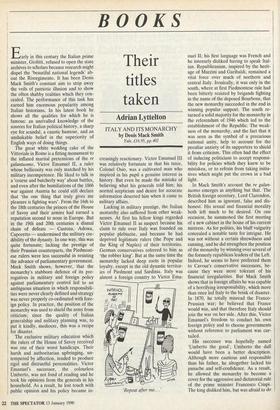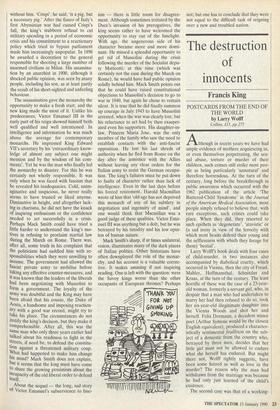BOOKS
Their titles taken
Adrian Lyttelton
ITALY AND ITS MONARCHY by Denis Mack Smith
Yale, .06,95, pp.402
Early in this century the Italian prime minister, Giolitti, refused to open the state archives to scholars because research might dispel the 'beautiful national legends' ab- out the Risorgimento. It has been Denis Mack Smith's constant aim to strip away the veils of patriotic illusion and to show the often shabby realities which they con- cealed. The performance of this task has earned him enormous popularity among Italian historians. In his latest book he shows all the qualities for which he is famous: an unrivalled knowledge of the sources for Italian political history, a sharp eye for scandal, a caustic humour, and an unshakable belief in the superiority of English ways of doing things.
The great white wedding cake of the Vittoriale in Rome is a fitting monument to the inflated martial pretensions of the re galantuomo, Victor Emanuel II, a ruler whose bellicosity was only matched by his military incompetence. He liked to talk in a 'coarse and butcherly way' about battles, and even after the humiliations of the 1866 war against Austria he could still declare that 'the one thing that truly gives me pleasure is fighting wars'. From the 16th to the 18th centuries the princes of the House of Savoy and their armies had earned a reputation second to none in Europe. But in the 19th and 20th centuries a dismal chain of defeats — Custoza, Adowa, Caporetto — undermined the military cre- dibility of the dynasty. In one way, this was quite fortunate; lacking the prestige of their Prussian counterparts, the Piedmont- ese rulers were less successful in resisting the advance of parliamentary government. Mack Smith shows, however, that the monarchy's stubborn defence of its pre- rogatives in military and foreign policy against parliamentary control led to an ambiguous situation in which responsibili- ties were never clearly defined and strategy was never properly co-ordinated with fore- ign policy. In practice, the position of the monarchy was used to shield the army from criticism; since the quality of Italian generalship and military planning was, to put it kindly, mediocre, this was a recipe for disaster.
The exclusive military education which the rulers of the House of Savoy received was one of their worst handicaps. Their harsh and authoritarian upbringing, un- tempered by affection, tended to produce rigid and distrustful personalities. Victor Emanuel's successor, the colourless Umberto, was not fond of reading and he took his opinions from the generals in his household. As a result, he lost touch with public opinion and his policy became in- creasingly reactionary. Victor Emanuel III was relatively fortunate in that his tutor, Colonel Osio, was a cultivated man who inspired in his pupil a genuine interest in history. But even he made the mistake of believing what his generals told him; his normal scepticism and desire for accurate information deserted him when it came to military affairs.
Lacking in military prestige, the Italian monarchy also suffered from other weak- nesses. At first his fellow kings regarded Victor emanuel II as suspect because his claim to rule over Italy was founded on popular plebiscite, and because he had deprived legitimate rulers (the Pope and the King of Naples) of their territories. German conservatives referred to him as `the robber king'. But at the same time the monarchy lacked deep roots in popular loyalty, except in the old dynastic territor- ies of Piedmont and Sardinia. Italy was almost a foreign country to Victor Ema- 'Repeat after me...' nuel II; his first language was French and he intensely disliked having to speak Ital- ian. Republicanism, inspired by the herit- age of Mazzini and Garibaldi, remained a vital force over much of northern and central Italy. Ironically, it was only in the south, where at first Piedmontese rule had been bitterly resisted by brigands fighting in the name of the deposed Bourbons, that the new monarchy succeeded in the end in winning popular support. The south re- turned a solid majority for the monarchy in the referendum of 1946 which led to the establishment of the Republic. The weak- ness of the monarchy, and the fact that it was seen as the symbol of a precarious national unity, help to account for the peculiar anxiety of its supporters to shield it from criticism. This often had the effect of inducing politicians to accept responsi- bility for policies which they knew to be mistaken, or to refrain from taking initia- tives which might put the crown in a bad light.
In Mack Smith's account the re galan- tuomo emerges as anything but that. The British foreign secretary, Lord Clarendon, described him as ignorant, false and dis- honest. His sexual and financial morality both left much to be desired. On one occasion, he summoned the first meeting of a new cabinet in the house of his current mistress. As for politics, his bluff vulgarity concealed a notable taste for intrigue. He was not without a certain shrewdness and cunning, and he did strengthen the position of the monarchy by winning over several of the formerly republican leaders of the Left. Indeed, he seems to have preferred them to Cavour's conservative successors, be- cause they were more tolerant of his financial irregularities. But Mack Smith shows that in foreign affairs he was capable of a horrifying irresponsibility, which more than once led Italy to the brink of disaster. In 1870, he totally misread the Franco- Prussian war; he believed that France would win, and that therefore Italy should join the war on her side. After this, Victor Emanuel's freedom to conduct his own foreign policy and to choose governments without reference to parliament was cur- tailed.
His successor was hopefully named `Umberto the good'; Umberto the dull would have been a better description. Although more cautious and responsible than his father, he altogether lacked his panache and self-confidence. As a result, he allowed the monarchy to become a cover for the aggressive and dictatorial rule of the prime minister Francesco Crispi. The king disliked him, but was afraid to do without him. `Crispi', he said, is a pig, but a necessary pig.' After the fiasco of Italy's first Abyssinian war had caused Crispi's fall, the king's stubborn refusal to cut military spending in a period of economic crisis and his commitment to a reactionary policy which tried to bypass parliament made him increasingly unpopular. In 1898 he awarded a decoration to the general responsible for shooting a large number of unarmed civilians in Milan. His assassina- tion by an anarchist in 1900, although it shocked public opinion, was seen by .many people, including his son, as at least partly the result of his short-sighted and unfeeling behaviour.
The assassination gave the monarchy the opportunity to make a fresh start, and the new king made the most of it. Unlike his predecessors, Victor Emanuel III in the early part of his reign showed himself both well qualified and well intentioned. In intelligence and information he was much above the average for contemporary monarchs. He impressed King Edward VII's secretary by. his 'extraordinary know- ledge of almost any subject one might mention and by the wisdom of his com- ments'. Yet he was the man who finally led the monarchy to disaster. For this he was certainly not wholly responsible. It was only when he was faced with fascism that he revealed his inadequacies. Cold, unim- aginative and suspicious, he never really seems to have trusted or liked anyone. Diminutive in height, and altogether lack- ing in charisma, he did not have the knack of inspiring enthusiasm or the confidence needed to act successfully in a crisis. Perhaps Mack Smith could have tried a little harder to understand the king's mo- tives in refusing to proclaim martial law during the March on Rome. There was, after all, some truth in his complaint that the politicians had saddled him with re- sponsibilities which they were unwilling to assume. The government had allowed the fascist private army to mobilise before taking any effective counter-measures, and It was known that the leaders of the liberals had been negotiating with Mussolini to form a government. The loyalty of the army was doubtful and the King may have been afraid that his cousin, the Duke of Aosta, a handsome and imposing reaction- ary with a good war record, might try to take his place. The circumstances do not Justify the king's decision, but they make it Comprehensible. After all, this was the same man who only three years earlier had talked about his readiness to fight in the streets, if need be, to defend the constitu- tion against a threatened military coup. A.hat had happened to make him change his mind? Mack Smith does not explain, but it seems that the king must have come to share the growing pessimism about the itself.incapacity of the old liberal order to defend About the sequel — the long, sad story of Victor Emanuel's subservience to fasc-
ism — there is little room for disagree- ment. Although sometimes irritated by the Duce's invasion of his prerogatives, the king seems rather to have welcomed the opportunity to stay out of the limelight. With age, the ungenerous side of his character became more and more domi- nant. He missed a splendid opportunity to get rid of Mussolini during the crisis following the murder of the Socialist depu- ty Matteotti; at this time (which was certainly not the case during the March on Rome), he would have had public opinion solidly behind him. Mack Smith points out that he could have raised constitutional objections to Mussolini's decision to go to war in 1940, but again he chose to remain silent. It is true that he did finally summon up courage in July 1943 to have Mussolini arrested, when the war was clearly lost, but his reluctance to act had by then exasper- ated even his supporters. His daughter-in- law, Princess Maria Jose, was the only member of the family who saw the need to establish contacts with the anti-fascist opposition. He lost his last shreds of authority when he fled from Rome on the day after the armistice with the Allies without leaving any clear orders for the Italian army to resist the German occupa- tion. The king's failures must be put down to faults of character rather than lack of intelligence. Even in the last days before his forced retirement, Harold Macmillan wrote of him that 'old age has not deprived this monarch of any of his subtlety in negotiation and ingenuity of mind', and one would think that Macmillan was a good judge of these qualities. Victor Ema- nuel III was anything but a dolt, but he was betrayed by his timidity and his low opin- ion of human nature.
Mack Smith's sharp, if at times unilateral, vision, illuminates many of the dark places of Italian politics. Other historians have often downplayed the role of the monar- chy, and his account is a valuable correc- tive. It makes amusing if not inspiring reading. One is left with the question: were the Savoy kings worse than the other occupants of European thrones? Perhaps not; but one has to conclude that they were not equal to the difficult task of reigning over a new and troubled nation.











































 Previous page
Previous page